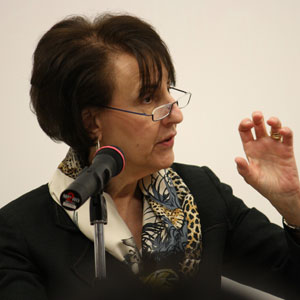Information
Venue
Start
End
22 February 2011 | CIL Supported Seminar
The Politics of Trade and Globalization and the Use of Trade Laws in Response

Introduction
What are the factors that bear upon the politics of trade and globalization, and how do governments and private parties alike respond to intensified global competition? In this public lecture, Ambassador Barshefsky discussed the acceleration of globalization, the reemergence of China as a major economic power, the intensification of competitive pressures and job impacts, the effects of global recession and public attitudes toward trade and globalization. Responses to these pressures have varied from diplomatic protest to protectionist action, the forging of FTAs and special alliances to gain competitive advantage, and the robust use of trade laws, including the WTO. It is, in particular, international trade commitments and the use of trade laws that have helped to ground the debate, and provide a relatively transparent, fair and apolitical means of resolving disputes.
About the Speaker
Ambassador Charlene Barshefsky, Senior International Partner at WilmerHale in Washington, DC, advises multinational corporations on their market access, investment and acquisition strategies across the globe. She has long been renowned in the US and around the world for her negotiating, policy and legal skills in transactions with governments, state-owned enterprises and private parties. She joined WilmerHale after serving as the United States Trade Representative from 1997 to 2001 and acting and deputy USTR from 1993 to 1996. As the USTR and a member of the President’s Cabinet, Ambassador Barshefsky was responsible for the formulation of US trade policy and the negotiation of hundreds of complex trade and investment agreements that significantly opened markets, removed regulatory barriers, and cemented protections for US investment from Europe to Asia, Africa to Latin America, and the Middle East. She also led the negotiation of global agreements to open the financial services and telecommunications sectors, remove global tariffs on information technology products, and protect intellectual property rights. Ambassador Barshefsky is best known globally as the architect and negotiator of China’s WTO agreement, which opened China’s economy as a worldwide market. This agreement, of undisputed historical importance, has helped to reshape the global economic landscape. A renowned figure among governments and policymakers around the world and in the legal profession, and long at center stage in the development of international trade policy, Ambassador Barshefsky has been honored by both Harvard and Yale law schools. Her negotiations are the subject of several Harvard Business School case studies; and her negotiating skills and legal talent have been heavily profiled in a large number of books, magazines and newspapers. She is a frequent lecturer and op-ed contributor in the US and abroad on trade and economic issues of importance, and is the recipient of a number of honorary degrees and numerous other accolades for lifetime achievement. She is recognized as one of the decade’s most influential lawyers in the United States, and is a member of a broad range of foreign policy-oriented and economic institutions devoted to public policy and international relations. Ambassador Barshefsky serves on the Boards of Directors of American Express Co., Intel Corporation, Estee Lauder Companies and Starwood Hotels & Resorts. She is also a Trustee of the Howard Hughes Medical Institute and a member of the Council on Foreign Relations.


